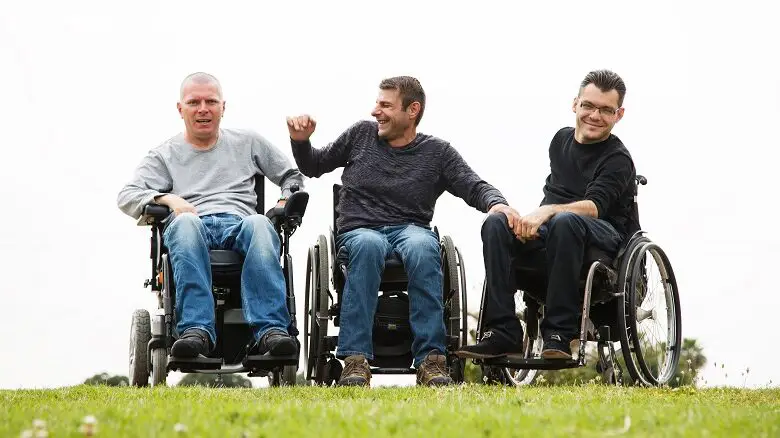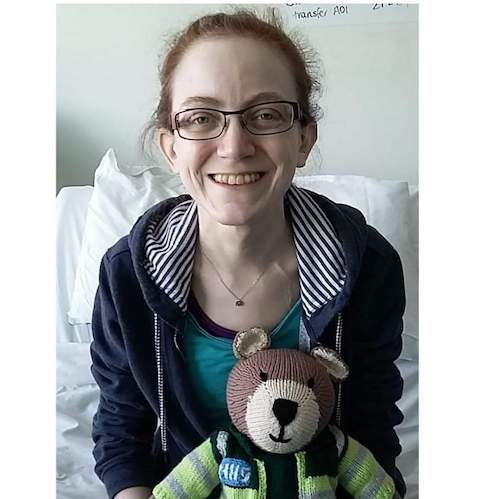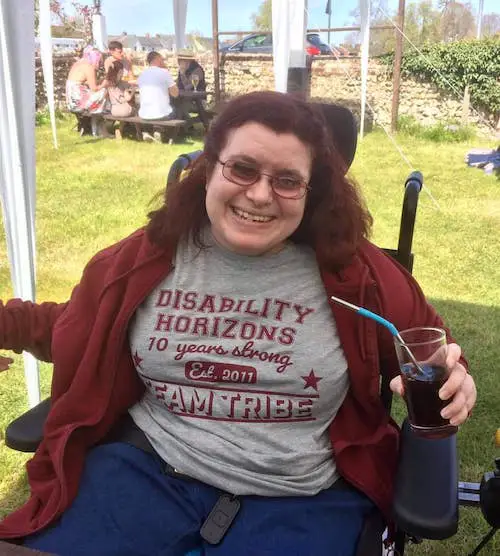
The value of peer support and how it can benefit your wellbeing if you have a disability or health condition
The Spokz People wellbeing programme – a mental health platform for disabled people and those with health conditions and their families – recently celebrated six months and has grown a small supportive group of community members in that time.
One member who joined the programme, Kimberley Pett, shares with Disability Horizons her experience of using the platform so far, how the group peer support has benefited her and how she’d like to see it grow further in the future.
Take advantage of a one-month FREE trial to discover how the platform can help you. After this time, it will cost £5 a month or £50 a year.
Tell us about yourself and your disability/health condition?
I have a few disabilities and conditions. My main one is Ehlers Danlos Syndrome (EDS), which mainly affects my joints. One of the biggest impacts for me is on my digestive system. I have an intestinal failure, requiring Total Parenteral Nutrition (TPN) for nutrition (feeding/hydration via the veins).
I am a full-time wheelchair user but due to orthostatic intolerance (a fast heart rate or low blood pressure when standing/sitting) and vestibular migraines, I am unable to sit up and so spend most of my time in bed.
I wear hearing aids in both ears and have some visual difficulties as well.
I also have seronegative arthritis, adrenal insufficiency (damaged adrenal gland) and Chiari malformation, where the lower part of the brain pushes down into the spinal canal.
I live with a close friend, Janet, whom I met when I was at university. She is not my carer but does help me with a lot of tasks around the house, including some personal care, such as my catheter when my carers aren’t around (I’m lucky to have such a good friend!). We’ve lived together for about five years now.
I have carers through social services four times a day that help me with personal care, and I have nurses twice a day that does my TPN connection and disconnection (it runs overnight). They also provide quite a lot of moral support and advocating when I need help with my medical team!

My mum lives close by and helps around the house with anything Janet and I can’t do (Janet also has EDS but less severely, so there are some things she can’t do either, such as reaching anything high up or lifting heavy things, so my mum helps with these things).
I’m not really well enough to work at the moment and I’m in and out of hospital a lot so keeping a job would be difficult. But I have been doing volunteer work for Patients on Intravenous and Nasogastric Nutrition Treatment (PINNT), which is a charity supporting people on artificial nutrition. I’m also doing some bits and pieces to support Spokz People as a volunteer.
In terms of hobbies, I used to enjoy playing music, getting outdoors and crafting, but I haven’t been able to do any of these recently. However, I’m currently learning Makaton and learnt 1600 signs so far!
I also run a Facebook group called Awesome Wheelies UK for wheelchair users. I enjoy doing this and being able to offer advice and support and chatting with my friends.
How did you discover Spokz People and what encouraged you to join the wellbeing programme?
I found out about Spokz People directly from Mel, who runs Spokz People, as I’d had previous one-to-one therapy with her, but not for a couple of years. I was keen to join because I feel that there are lots of aspects of managing my conditions that can be challenging on a day-to-day basis.
It’s really easy to kind of ignore all those issues and push them to the back of your mind rather than address them, but over time I think they build up.
Most of the time things don’t really bother me, but every so often everything feels like too much or I don’t know how to deal with it, and I’d rather take a proactive approach and work on those issues before they become a problem rather than once they are.
I knew from working with Mel previously that she has a really good understanding and knowledge of disability and the issues that come with it, so I was confident the programme would address the right kind of things.
Read our interview with Mel and her husband Steve, who is disabled, about how she came to set up Spokz People and their own experiences with mental health.
What aspects of the wellbeing programme have you found most useful so far?
The most useful thing for me is the Zoom group sessions. The community aspect means you can discuss and interact with people going through similar problems and share advice and ideas., It also makes you feel less alone in what you are going through.
I personally have always found one-to-one therapy very challenging. Although I got a lot out of my individual sessions with Mel, I find it very hard to talk about how I’m finding things.
This kind of group discussion allows me to think about and explore my situation by listening to others’ experiences, without having to find the words for my own feelings.
Mel, who leads the group, is a really positive person, so even though we are often talking about things that we find difficult, the mood is always positive and fun and I come out feeling I’ve had a great time (something I’ve never found with previous therapy) and I look forward to it each week.
Also, just my situation means I can’t leave my bed (and therefore the house except for hospital appointments), so I don’t see many people (except my nurses), so it’s also just nice to socialise and chat with people every week outside of a medical setting.
Have you ever had mental health support before and how does it differ from the Spokz People services?
I’ve had a few forms of mental health support before. The initial NHS referral I was refused after assessment as I was neither depressed nor anxious. However, it would only have been six weeks anyway, whereas the Spokz People programme is much longer-term.
I was later offered psychological support and had Cognitive Behavioural Therapy (CBT) based sessions, but neither of these had an understanding of disability and were very generic. The psychology was more of an information gathering session to feedback to my doctors rather than offering any practical support to help me going forward.
I also had sessions one-to-one with Mel and another therapist – both had a good understanding of disability, but in terms of pricing the value for money.
The Spokz People programme is much more affordable in the long term for me than one-to-one, and the personal value I take from it is also much richer.
What would you say to other people considering joining the Spokz People programme?
Go for it! I wasn’t totally sure about this before I started but I would now 100% recommend this to anyone who needs some support with any aspect of their disability or wellbeing.
I think we all have ways we can improve our wellbeing, even if we feel we aren’t doing that badly. I’m not unhappy or particularly struggling, I just want to address any small issues before they become big issues and this programme is full of great ways to do it.
Try the Spoke People platform for a one-month FREE trial.
Emma Purcell’s thoughts on the Spokz People wellbeing programme

Another member who is benefiting from the Spokz People wellbeing programme is our very own editor and writer Emma Purcell. She also wanted to share with us a few words on how she is finding the platform:
“When I first found out about the Spokz People wellbeing programme, I immediately knew I wanted to join. The fact that it is specifically designed for disabled people, can be fully accessed online and can be worked through at your own pace, means it is the perfect tool for me to manage my mental health.
I particularly enjoy our weekly group sessions on Zoom, where we can share each other’s stories and advise each other on different issues. Plus, it feels very sociable and we have great laughs together.
I love watching the contributor videos as well – which include Alex Brooker, Simon Minty and Martyn Sibley – and learning about people’s experiences and how they live with their different disabilities and impairments.
Also, throughout the online course and during our group sessions, I like discovering and being suggested websites, blogs, videos and books relating to disability and wellbeing.
Overall, I believe the Spokz People programme has extremely useful resources, amazing support and engaging videos, activities and events. Definitely worth the money!”
Wellbeing Wednesdays: peer support sessions
At Spokz People, members can join “Wellbeing Wednesdays”, which are weekly peer support sessions via Zoom.
Here is a snippet of a session in which members discuss the power of touch for healing. [To play captions on this video, click the ‘CC’ button].
Become a member of the Spokz People wellbeing programme
Spokz People’s new online resource includes information and tool kits on how to improve self-esteem and manage the many challenging situations being disabled brings. It also enables you to work with a peer to improve your mental health and wellbeing.
It has a forum, a chat room, regular live events and Q&As and videos from high-profile disabled people.
Although Spokz People is a not-for-profit organisation and the lottery has funded the set-up of the platform, there are ongoing costs to run the service – around £10,000 a year. Therefore, there is a fee to sign up for the wellbeing community and programme.
However, thanks to a further Lottery Community Fund grant, Spokz People is able to offer a year’s membership for just £50 or £5 a month. You can also get a one-month FREE trial.
It will also be looking for contributors to share their stories in exchange for a reduced membership.
To register as a member of the online wellbeing programme and community, visit www.spokzpeople.org.uk/register.
As a partner of Spokz People and this new online platform, Disability Horizons will take a small percentage of the money made after costs are paid for. This will cover our promotion of the platform, now at the launch and on an ongoing basis.
As a small and largely voluntary-run organisation, looking to become sustainable and pay more disabled people, partnerships like this will help to secure our future at Disability Horizons.
To find out more about Spokz People’s mental health services and how to sign up for its online wellbeing community and programme, visit our mental health support page.
By Disability Horizons
More on Disability Horizons…